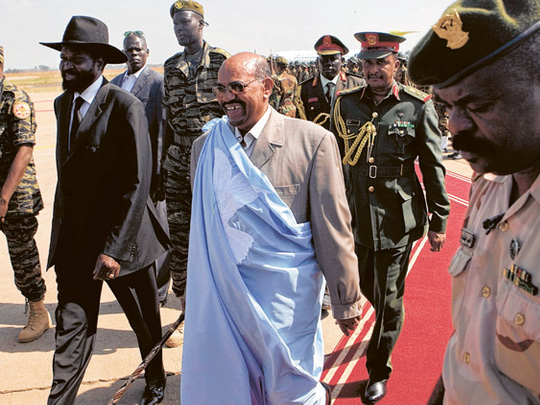
Juba, Southern Sudan: Dr Barnaba Marial Benjamin, minister of information and Broadcasting in the Government of southern Sudan (GoSS), who is also the GoSS spokesman, talked to Gulf News in an exclusive interview. Regarding Darfur, Benjamin said that an independent South Sudan would never allow Darfur rebels to launch attacks on the north from their soil.
Full text of the interview:
In case of the Southern separation, how would you deal with the Darfur dossier?
We in GoSS, whether now or after separation, will never allow Darfur movements to launch any military operations against the North from the South as we believe that the CPA, which we have signed with the NCP in Naivasha is an agreement that can be applied to solve Sudan's political problems, including Darfur's.
What was reported in the media about Darfur's leaders in the South and their intention of launching attacks against the North is incorrect. Khalil Ebrahim and Abdul Wahid Noor, both senior leaders of Darfur's armed movements never visit Southern Sudan. The former is living in Libya and the latter in France. As for the third leader Minni Arcu Minnawi he is in Juba temporarily and not for political purposes.
How do you estimate the volume of aid so far extended to you by the American government?
I think it is significant support through the United States Agency for International Development (Usaid) which is working on basic infrastructure, education and health services as well as a paved road from Juba to borders with Uganda with a cost of $200 million (Dh735 million).
I expect America's aid to reach $1 billion according to the projects they are working on.
What about military assistance?
We received no military assistance from the American government but we receive such assistance from Western countries in areas like developing human capabilities of our armed forces to turn it into a regular, professional army. We have started this since 2005.
Some fear a re-escalation of armed conflict between the North and the South if certain issues are not settled before the referendum. How do you see that?
The two partners have agreed on the "no to war and yes to peace," principle. This is the commitment of President Bashir and President Salva Kiir.
There is an agreement and it stipulates that people of Southern Sudan have the right to self-determination and the choice of either unity or separation. This makes it impossible to resort to war.
What we have been agreed upon is not something made in the presence of delegations from the North and South only, but there have been international organisations involved in this agreement and have significant role in restoring peace; to mention for instance, the UN and its Security Council, the African Union, the Arab League, the US, Britain and neighbouring countries including Egypt and Libya.
It was decided that 12,000 UN peacekeeping forces were to be deployed to maintain peace between the two parties and monitor the implementation of the Comprehensive Peace Agreement (CPA).
But there is a mobilisation of Northern and Southern forces on the border between the North and the South which reflect a tense situation?
It is natural to have problems between the two sides. In any area where there are international forces, there would be scrimmages. In case of any problem we consult the agreement. Recently the Sudanese Defence Minister met the leader of liberation army of the South and they have agreed to have police forces to protect oil fields.
How do you evaluate the progress for referendum and relevant arrangements between the two partners so far in this context?
Matters are moving reasonably. Registration of voters, for instance, has been very successful as there is a keenness from the people of the South to take part in the referendum. The number of those registered in the South amounted to 3.5 million.
What about the ratio of this figure from the total population of the South?
The ratio is reasonable putting into account that as those have the right to register should be over 18.
The total population of the South is around 8.5 million, 60 per cent of those registered should vote to make it valid.
This was stipulated by the Referendum Law and we should abide by it to make results valid.
In Khartoum, the number of those registered was not as anticipated due to the fact that Southerners left for Juba to register to guarantee an opportunity to express their opinions Some Southerners in the North said they can't register as they could not come back for voting and as a result many Southerners in the North did not register their names. Others have returned to the South to register and stay.
They returned back because they left as a result of the war and after peace was realised, they returned back to build their society. Following the 2005 peace agreement, the government in the North and GoSS as well as international organisations should help this group to voluntarily return to their homes in the South as some of them are employees in the central government and are still holding their posts.
There is controversy over dual nationality for Southerners living in the North and Northerners living in the South. What would be your stance in case the government in the North declined to grant Southerners in the North its nationality?
In all cases, we will grant Northerners living in the South the nationality of the new Southern state if they want. (Laughs) Even if President Omar Al Bashir wants the nationality of the new state we will grant it to him.












